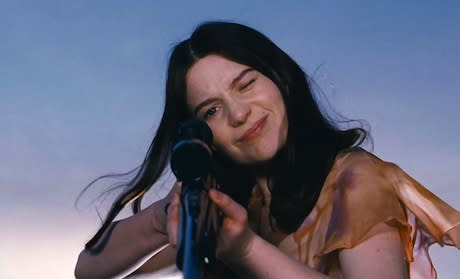To reduce Chan-wook Park's English-language debut Stoker, to its superficial plot elements, focusing on the conventional aspects of its female coming-of-age sexual exploration, would be a disservice to the intensely emotional and operatic construct of a movie that takes advantage of every component. Careful shot composition, pornographic cinematography, impeccable costuming, a powerful, slowly compounding score (care of Clint Mansell), and a shadowy gothic palette all contribute to an overall tone and structure that implicitly reiterates the taboo, perverse themes.
On the surface, amidst the creative graphic matches, plays with lighting and framing that considers every line and placement in relation to the trajectory of the entire film, teenage India Stoker (Mia Wasikowska) struggles with the death of her father (Dermot Mulroney) by bonding and passively flirting with her uncle Charlie (Matthew Goode). Said uncle is someone India was previously unaware of, and being the younger brother of her father, is nostalgic sexual titillation for India's mother Evelyn (Nicole Kidman), who sees only a composite of her husband when he was sexier and more fun.
There's a mystery component to the film, since no one really knows how or why Charlie has popped up unannounced—although Aunt Gin (Jacki Weaver) seems aware that something is amiss—as well as an alienated, almost supernatural, aspect to India herself. Voiceovers about seeing things in a way that others are incapable of and having a socially abject disposition that distances her from her mother and classmates, gives the dark familial secrets an element of psychological and emotional instability.
But rather than reveal secrets and twists in a standard manner, Chan-wook Park builds every sequence of the film as a propulsive, slowly building series of increasingly erratic and choreographed moments that eventually reach a climax with violent or perverse acts. India's stoic gaze is eventually given a sexual component, which is made a distorted reality by the violent acts that occur only when the score, editing and cinematography structure a scene to suggest a sexual act despite never actually featuring coitus.
Death and brutal violence is the equivalent of an orgasm, which is exacerbated and accentuated by India's forced sexual awakening from her uncle. The competition element injected by her mother, who similarly acknowledges the intense hormonal dynamic of uncle Charlie, injects the Freudian element of psychosexual development in our dark, conflicted protagonist.
Because Stoker forces the audience to attribute visceral, carnal acts with violent imagery, imposing the guilt of arousal, or shock, by superimposing violence over pleasurable moments, the natural response is that of defensiveness and hostility—especially in those with a particularly rigid, or heteronormative, moral core. But the sheer visceral, experiential component is ostensibly the purpose of this film.
Telling a mysterious story about a family with hidden secrets is merely the impetus behind a work that finds the beauty in creating a feeling and forced, displeasing associations. Chan-wook Park has crafted a cinematic opera that is far more concerned with intense self-reflection and feeling than it is basic plot, which, in a world of literal interpretation, means its audience is very limited.
(Fox)On the surface, amidst the creative graphic matches, plays with lighting and framing that considers every line and placement in relation to the trajectory of the entire film, teenage India Stoker (Mia Wasikowska) struggles with the death of her father (Dermot Mulroney) by bonding and passively flirting with her uncle Charlie (Matthew Goode). Said uncle is someone India was previously unaware of, and being the younger brother of her father, is nostalgic sexual titillation for India's mother Evelyn (Nicole Kidman), who sees only a composite of her husband when he was sexier and more fun.
There's a mystery component to the film, since no one really knows how or why Charlie has popped up unannounced—although Aunt Gin (Jacki Weaver) seems aware that something is amiss—as well as an alienated, almost supernatural, aspect to India herself. Voiceovers about seeing things in a way that others are incapable of and having a socially abject disposition that distances her from her mother and classmates, gives the dark familial secrets an element of psychological and emotional instability.
But rather than reveal secrets and twists in a standard manner, Chan-wook Park builds every sequence of the film as a propulsive, slowly building series of increasingly erratic and choreographed moments that eventually reach a climax with violent or perverse acts. India's stoic gaze is eventually given a sexual component, which is made a distorted reality by the violent acts that occur only when the score, editing and cinematography structure a scene to suggest a sexual act despite never actually featuring coitus.
Death and brutal violence is the equivalent of an orgasm, which is exacerbated and accentuated by India's forced sexual awakening from her uncle. The competition element injected by her mother, who similarly acknowledges the intense hormonal dynamic of uncle Charlie, injects the Freudian element of psychosexual development in our dark, conflicted protagonist.
Because Stoker forces the audience to attribute visceral, carnal acts with violent imagery, imposing the guilt of arousal, or shock, by superimposing violence over pleasurable moments, the natural response is that of defensiveness and hostility—especially in those with a particularly rigid, or heteronormative, moral core. But the sheer visceral, experiential component is ostensibly the purpose of this film.
Telling a mysterious story about a family with hidden secrets is merely the impetus behind a work that finds the beauty in creating a feeling and forced, displeasing associations. Chan-wook Park has crafted a cinematic opera that is far more concerned with intense self-reflection and feeling than it is basic plot, which, in a world of literal interpretation, means its audience is very limited.
